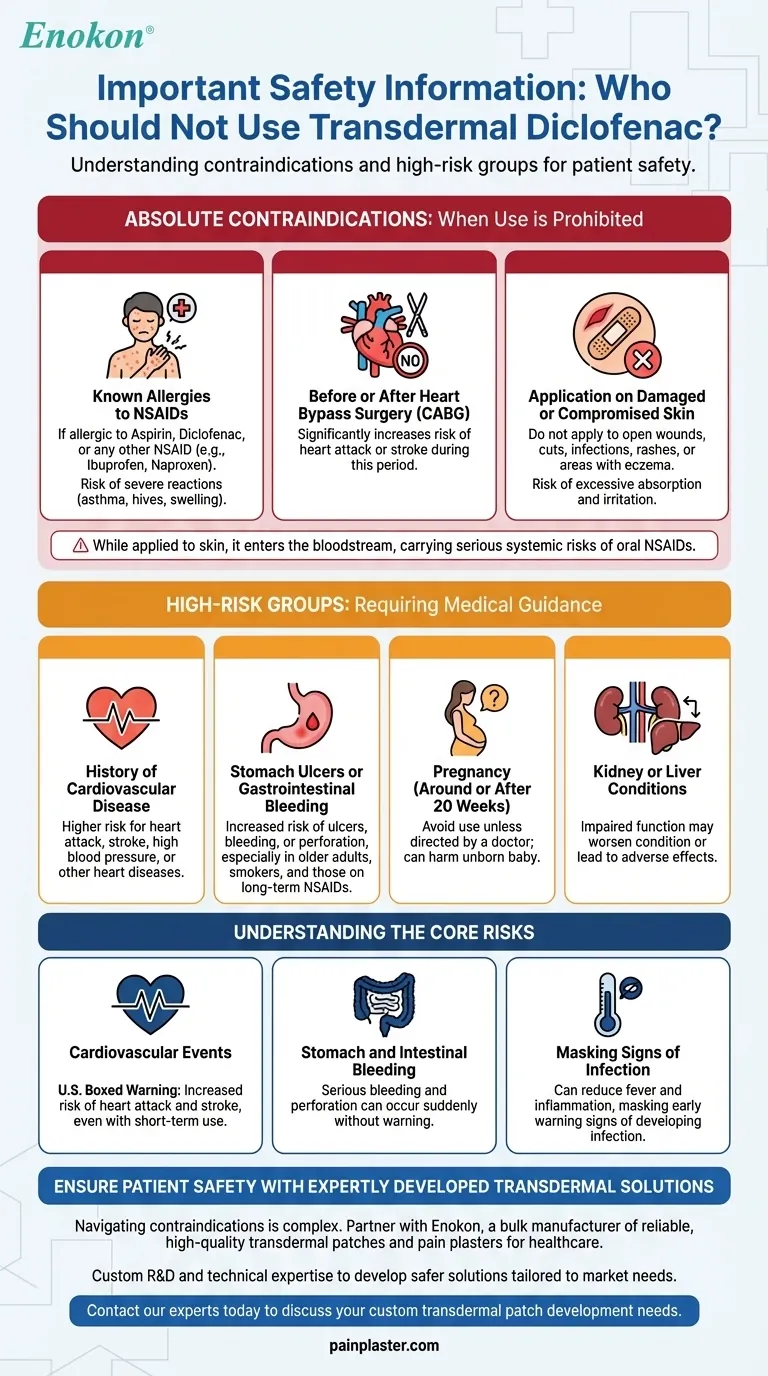Certain individuals should not use transdermal diclofenac due to significant health risks. This includes anyone with a known allergy to diclofenac, aspirin, or other NSAIDs; patients who are about to undergo or have recently had coronary artery bypass graft (CABG) surgery; and those who intend to apply it on damaged skin, such as open wounds, eczema, or infections.
While applied to the skin, transdermal diclofenac is a nonsteroidal anti-inflammatory drug (NSAID) that enters your bloodstream. Therefore, it carries the same serious systemic risks as oral NSAIDs, including an increased danger of heart attack, stroke, and stomach bleeding.

Absolute Contraindications: When Use is Prohibited
Certain conditions make the use of transdermal diclofenac unsafe. These are not suggestions but firm medical contraindications.
Known Allergies to NSAIDs
If you have ever had an allergic reaction, such as asthma, hives, or swelling, after taking aspirin, diclofenac, or any other NSAID (like ibuprofen or naproxen), you must not use this medication. An allergic reaction could be severe.
Before or After Heart Bypass Surgery
You should not use transdermal diclofenac right before or after a coronary artery bypass graft (CABG) surgery. Using an NSAID during this period significantly increases the risk of having a heart attack or stroke.
Application on Damaged or Compromised Skin
The medication should never be applied to skin that is not intact. This includes open wounds, cuts, infections, rashes, or areas affected by eczema. Applying the patch to damaged skin can lead to excessive absorption of the drug and localized irritation.
High-Risk Groups Requiring Medical Guidance
Even if you don't have an absolute contraindication, you may belong to a group that is at higher risk for severe side effects. You must consult your doctor if you have a history of the following conditions.
History of Cardiovascular Disease
Anyone with a history of heart attack, stroke, high blood pressure, or other heart diseases is at a higher risk for serious cardiovascular events when using NSAIDs. These events can occur without warning and may be fatal.
Stomach Ulcers or Gastrointestinal Bleeding
NSAIDs can cause ulcers, bleeding, or holes in the stomach and intestines. This risk is higher for older adults, those in poor health, individuals who smoke or consume alcohol, and those on long-term NSAID therapy.
Pregnancy
You should avoid using transdermal diclofenac around or after 20 weeks of pregnancy unless specifically directed by a doctor. NSAID use during this time can cause harm to the unborn baby.
Kidney or Liver Conditions
Your kidneys and liver are responsible for processing and clearing medications from your body. If you have impaired kidney or liver function, using diclofenac could worsen your condition or lead to adverse effects.
Understanding the Core Risks
The most serious warnings associated with transdermal diclofenac are not related to the skin but to its effects on the entire body once absorbed.
The Risk of Cardiovascular Events
All NSAIDs, including transdermal diclofenac, carry a U.S. Boxed Warning for an increased risk of heart attack and stroke. This risk is present even with short-term use and may increase the longer you use the medication.
The Danger of Stomach and Intestinal Bleeding
NSAIDs block enzymes that help protect the lining of your stomach. This can lead to serious gastrointestinal bleeding and perforation, which can occur suddenly and without prior symptoms.
Masking Signs of Infection
Diclofenac can reduce fever and inflammation, which may mask the early warning signs of a developing infection. It's important to monitor for other symptoms if you feel unwell.
Making an Informed Decision with Your Doctor
A conversation with your healthcare provider is the only way to determine if transdermal diclofenac is a safe choice for your specific health profile.
- If you have a history of heart problems or stroke: You must discuss the cardiovascular risks and weigh them against the potential benefits for pain relief.
- If you have a sensitive stomach or a history of ulcers: Ask your doctor about the potential for gastrointestinal bleeding and if alternative pain medications are more appropriate.
- If you are over 65, smoke, or drink alcohol regularly: Acknowledge that you are in a higher-risk category and must be vigilant in monitoring for side effects.
- If you have any other chronic condition, especially related to your liver or kidneys: Ensure your doctor is fully aware of your medical history before they prescribe this medication.
Ultimately, your complete health history is the critical factor in determining whether this medication is safe for you.
Summary Table:
| Contraindication Group | Key Reason to Avoid |
|---|---|
| NSAID Allergy | Risk of severe allergic reactions (asthma, hives, swelling). |
| Pre/Post-CABG Surgery | Significantly increased risk of heart attack or stroke. |
| Damaged Skin | Applying to wounds, eczema, or infections causes excessive drug absorption. |
| Pregnancy (≥20 weeks) | Can cause serious harm to the unborn baby. |
| Cardiovascular Disease | Higher risk of fatal heart attack, stroke, or blood clots. |
| Stomach Ulcers/Bleeding | NSAIDs can cause serious gastrointestinal bleeding. |
| Kidney/Liver Impairment | Can worsen the condition due to the body's inability to process the drug safely. |
Ensure Patient Safety with Expertly Developed Transdermal Solutions
Navigating the contraindications and risks of medications like diclofenac is complex. Partner with Enokon, a bulk manufacturer of reliable, high-quality transdermal patches and pain plasters for healthcare and pharmaceutical distributors and brands.
We provide more than just manufacturing; we offer custom R&D and technical expertise to help you develop safer, effective transdermal solutions tailored to your target market's needs. Let's collaborate to create products that prioritize patient safety.
Contact our experts today to discuss your custom transdermal patch development needs.
Visual Guide

Related Products
- Far Infrared Deep Heat Relief Patches Medicated Pain Relief Patches
- Far Infrared Heat Pain Relief Patches Transdermal Patches
- Heating Pain Relief Patches for Menstrual Cramps
- Asthma Cough and Pain Relief Patch for Adults and Kids
- Mugwort Wormwood Pain Relief Patch for Neck Pain
People Also Ask
- What are pain relief patches and how are they used? A Guide to Safe, Targeted Relief
- How do Deep Heat Pain Relief Patches provide pain relief? Discover the Drug-Free Mechanism
- How does the Deep Heat Back Patch work? A Drug-Free Solution for Targeted Pain Relief
- How often should pain relief patches be used? Get the Right Schedule for Targeted Relief
- How effective are pain relief patches for muscle pain? Target Localized Pain with Transdermal Delivery















